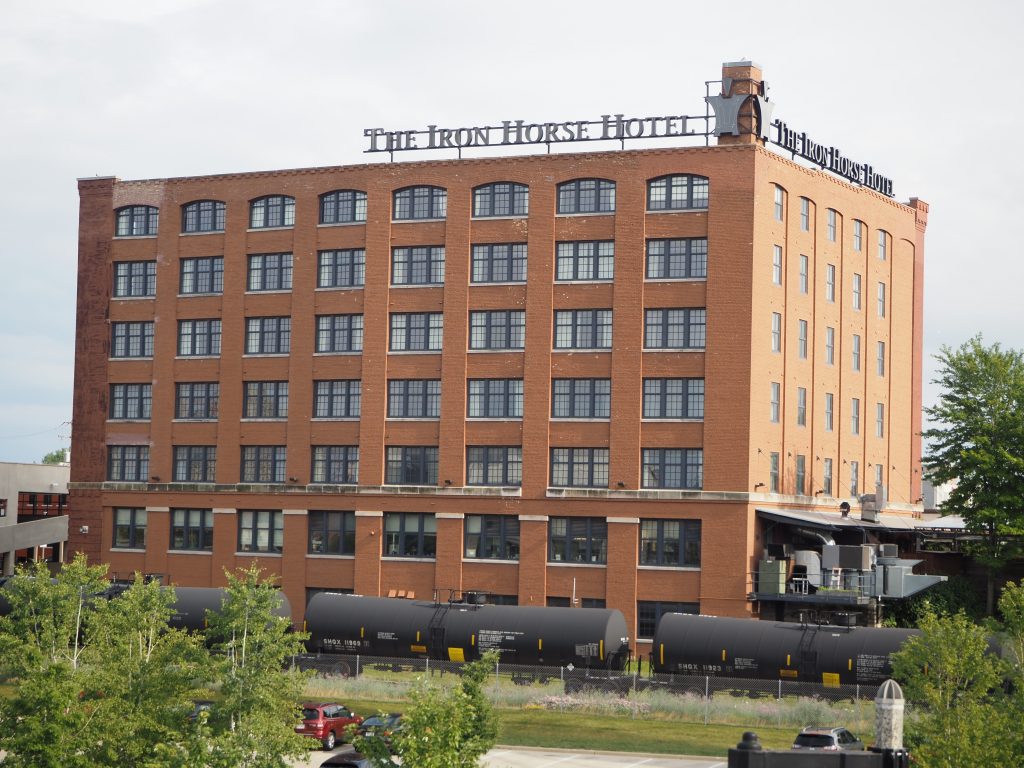Deal Prevents Iron Horse Hotel Foreclosure
Plus: Trouble for downtown hotels. And a recap of the week's real estate news.
Real estate developer Tim Dixon will keep control of The Iron Horse Hotel after all.
Dixon successfully navigated a 2021 foreclosure case and a 2022 Chapter 11 bankruptcy case, filed in part to slow the foreclosure, to allow his firm to continue to own the Walker’s Point hotel.
The 100-room boutique hotel, 500 W. Florida St., has been regarded as one of the city’s premier hotels since it opened in 2008. It’s drawn special attention for its public-facing bars and restaurants and its support for guests with motorcycles.
Just a few months ago, the hotel seemed like it would soon have a new owner. It was marketed for sale, and an auction was scheduled. But, while this was playing out, Dixon was negotiating with GS Mortgage Securities Corporation II, an entity created by Goldman Sachs to hold investments in several mortgages, and the loan’s servicer Rialto Capital.
The auction was ultimately canceled, according to Delaware bankruptcy court documents, because broker JLL didn’t find a buyer willing to pay more than the $24 million owed on the secured loan.
Now, a revised loan agreement would create a more sustainable operation for the hotel, and Dixon’s ownership of it.
“The Debtor simply cannot sustain its operations at this juncture without the cooperation and assistance of [the lender], and the Debtor’s path forward depends upon [the lender]’s cooperation and its agreement with the treatment of its secured claim,” wrote Dixon of the need for a new agreement.
The business owner also said the legal entanglement had impacted the hotel’s staff.
“Tasks related to the Chapter 11 case and the sale process have also impacted morale and imposed additional burdens on the Debtor’s management and staff at a time when, as reflected in the Budget, margins are thin and attention is needed to drive business to the hotel. I, therefore, believe it is in the best interests of the estate for hotel operations to continue without disruptions that may be caused by a transition of ownership or by continuation of the Chapter 11 case,” wrote Dixon.
Earlier this month, Dixon invested $100,000 in Rider Hotel LLC, the hotel’s legal entity of which he is the majority investor, to address a cash flow shortfall. Terms of the larger settlement require Rider Hotel to pay its lender approximately $4.9 million to reinstate the loan in good standing. That must be done by the end of the year to avoid default. Rider Hotel must also engage in “certain cash management protocols.” Specific details on the reinstatement agreement are unavailable because the agreement was filed under seal.
According to a court document, Rider Hotel anticipates owing more than $756,000 in administrative fees to resolve the Chapter 11 case. “Cash flow is tight,” says the settlement motion, but the entity is expected to be able to pay all of the costs if relief is granted by the lender.
An income statement submitted as part of the bankruptcy case shows Rider Hotel lost $446,584 in October, the last month available, but turned a gross operating profit of $66,889 on $684,172 in revenue.
The Iron Horse isn’t the only Milwaukee hotel to face financial difficulties. A sheriff’s sale is scheduled to resolve a foreclosure of the Cambria Hotel in Westown. Two other downtown hotels have recently endured foreclosure actions. In July, the 138-room Hampton Inn & Suites, 176 W. Wisconsin Ave., was transferred to its lender in lieu of foreclosure. A Fairfield Inn & Suites was sold in a 2022 sheriff’s sale.
Weekly Recap
Demolition Underway On Walker’s Point Seed Warehouse
An 11-story, 150,000-square-foot building once described as “one of the strongest and heaviest concrete structures in the country” will soon be no more.
Demolition work is underway on the wedge-shaped Courteen Seed Company warehouse at 222 W. Freshwater Way.
New Berlin Grading is razing the building on behalf of a company affiliated with Rite-Hite Holding Corporation, which has its new corporate headquarters to the west. A raze permit lists the estimated cost at $1.5 million.
“[The company] looked at multiple options to renovate and/or repurpose the building, but after many years of vacancy, expert engineering studies report that the building structure has deteriorated beyond repair,” said a spokesperson for SixSibs Capital in a statement in September. “Ownership intends to save or recycle materials and objects found within the building for future use. Development plans for the property are in the early stages with nothing definitive to share at this time.”
21 Construction Companies in State Violated Prevailing Wage Laws
More than 140 construction workers will receive back pay following a federal investigation into wages paid on a housing development in Oconomowoc.
According to a statement from the U.S. Department of Labor, 21 construction companies violated prevailing wage laws while working on a federally-assisted 302-unit apartment complex in the Pabst Farms development in Waukesha County.
The department’s Wage and Hour Division investigated the development, which is insured by the U.S. Department of Housing and Urban Development and is subject to the Davis-Bacon and Related Acts. That law requires that workers on federally assisted construction projects are paid no less than the prevailing local wage.
Through the investigation, the department found that 142 workers were shortchanged in hourly and overtime wages by more than $1.2 million.
Downtown Hotel Faces Sheriff’s Sale
The Cambria Hotel in Westown will likely soon have a new owner.
The four-story, 132-room hotel opened in August 2019, just months before the COVID-19 pandemic decimated the travel sector.
Project lender Access Point Financial filed a $17.5 million foreclosure suit in July against an affiliate of the Chicago-based hotel developer Murphy Development Group. A receiver was appointed to oversee the property.
In November, Milwaukee County Circuit Court Judge Thomas J. McAdams granted the foreclosure.
County Awarded Federal Funding For Affordable Housing
Milwaukee County’s Housing Division was awarded $1.8 million in federal funding for affordable housing programs.
The funding comes from the U.S. Department of Housing and Urban Development and a new grant program called Housing Mobility Services. Officials from the county and HUD gathered at an affordable housing development in Brown Deer to announce the $25 million in grant awards that went to seven housing agencies across the nation.
The program provides funding for housing agencies to expand housing mobility programs that help families using Section 8 housing vouchers move to neighborhoods with high-performing schools, jobs, low crime rates and other amenities. The grants were made for agencies that have “expressed an ability to house families through the voucher program, but also help families move to areas of higher opportunity,” said Robert J. Monocchio, HUD Principal Deputy Assistant Secretary for Public and Indian Housing.
The funds can be used to help defray the cost of moving and to assist families in finding housing in new areas. These programs are aimed at supporting families with children.
Developer Plans To Save Long-Vacant Building
A state grant would advance the redevelopment of a long-vacant four-story building on Milwaukee’s Near West Side.
Developer Jason Waters, through his Watersview Investments Group, is pursuing redevelopment of the building, 2627-2631 W. State St., into six apartments and two first-floor commercial spaces. Plans call for marketing the commercial space to tenants interested in starting a cafe or opening a fitness training operation.
First built in 1913, the 10,064-square-foot building has been vacant for more than 20 years. But Waters is proposing a $1.1 million investment to renovate the property.
According to a pending resolution, Milwaukee County would serve as a sponsor for Waters to receive a $250,000 grant from the Wisconsin Economic Development Corporation (WEC). The county would not provide or serve as a pass-through for any of the funding. Watersview would be required to provide a 75% match to access the grant.
If you think stories like this are important, become a member of Urban Milwaukee and help support real, independent journalism. Plus you get some cool added benefits.






















